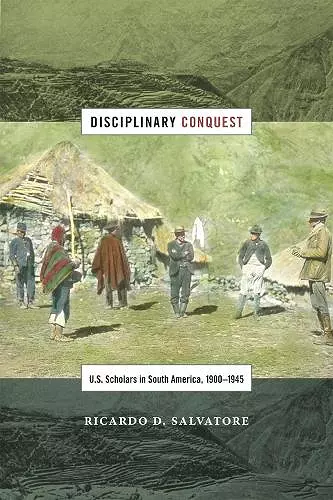Disciplinary Conquest
U.S. Scholars in South America, 1900–1945
Format:Paperback
Publisher:Duke University Press
Published:28th Mar '16
Currently unavailable, and unfortunately no date known when it will be back
This paperback is available in another edition too:
- Hardback£89.00(9780822360810)

In Disciplinary Conquest Ricardo D. Salvatore rewrites the origin story of Latin American studies by tracing the discipline's roots back to the first half of the twentieth century. Salvatore focuses on the work of five representative U.S. scholars of South America—historian Clarence Haring, geographer Isaiah Bowman, political scientist Leo Rowe, sociologist Edward Ross, and archaeologist Hiram Bingham—to show how Latin American studies was allied with U.S. business and foreign policy interests. Diplomats, policy makers, business investors, and the American public used the knowledge these and other scholars gathered to build an informal empire that fostered the growth of U.S. economic, technological, and cultural hegemony throughout the hemisphere. Tying the drive to know South America to the specialization and rise of Latin American studies, Salvatore shows how the disciplinary conquest of South America affirmed a new mode of American imperial engagement.
"Not only a well-documented, nuanced, and challenging account, but also a rare and bold attempt to write the history of the hemisphere from South to North instead of from North to South, Disciplinary Conquest will hopefully be published also in Spanish and Portuguese and read by all practitioners in the field across the Americas and beyond." -- Ori Preuss * Journal of Latin American Studies *
"This is a welcome and ambitious project that takes us into the empirical aspects of US-Latin American relations from the perspective of informal empires, with an original emphasis on the role of knowledge in the configuration of the powerful presence of the United States in the region. Extremely well documented and offering a narrative constructed from empirical data to make a point about hegemony, this book is a wonderful example of how situated knowledge can be explained in the structural context of inter-American relations." -- H. Reuben Neptune * American Historical Review *
"Disciplinary Conquests offers an excellent and incisive account of U.S. scholars, their interest in (and relationship with) South America, and the links between the work of these scholars, empire, and foreign policy." -- Evan C. Rothera * Journal of Global South Studies *
“[Salvatore] is, simply, a master raconteur. Disciplinary Conquest is essential reading for those with an interest in the evolution of inter-American relations.… It is a book that will assuredly warrant multiple rereadings.”
-- Philip Chrimes * International Affairs *"Authoritatively written, [Disciplinary Conquest] is both theoretically valuable and empirically rich in detailed historical research, essential reading for understanding the crucial role of educational asymmetry and US universities in shaping thought leadership and hegemonic relations in the Western Hemisphere during the twentieth century. . . . A pleasure to read, each page with surprises that enrich the author’s project; readers will admire the meticulous detail of his research." -- Edgar J. Dosman * Latin American Research Review *
"Disciplinary Conquest should be read by every scholar doing work in Latin America and teaching Latin American studies to undergraduate and graduate students. It is a valuable book that will promote intellectual debates about how we practice research and how our own aspirations lie within anything we write." -- Yovanna Pineda * The Latin Americanist *
"Truly admirable in its scope and depth, Salvatore’s analysis provides a convincing and detailed picture that broadens our understanding of inter-American relations, not to mention the emergence of the fields of sociology, geography, history, archaeology, and political science. . . . Disciplinary Knowledge will be of interest to intellectual history specialists and historians of Latin America, and should be required reading for Latin American Studies instructors, who may be inclined to re-think the emphasis on outdated 'problems' in their teaching once they understand the genesis of the approach." -- Amelia Kiddle * Canadian Journal of History *
ISBN: 9780822360957
Dimensions: unknown
Weight: 476g
344 pages